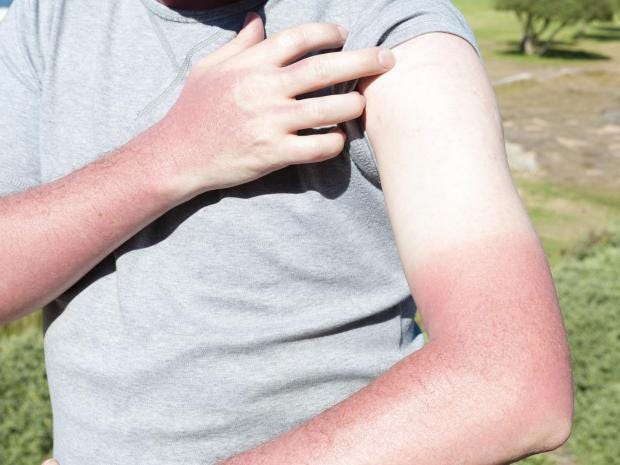
Sections of DNA that appear to play a role in controlling whether an individual’s skin burns or tans have been located by scientists.
In the largest genetic study of its kind, which used data from nearly 200,000 people, they laid the groundwork for genetic tests that could predict people’s responses to sunlight.
It is thought the discovery could also help researchers understand the onset of skin cancer – which affected 150,000 new patients in the UK every year.
Lead author of the study Dr Mario Falchi, a researcher at King’s College London, told The Independent that “a good percentage” of the sunburn genes they identified were also involved in skin cancer.
It is common knowledge that sunburn is a major risk factor in the development of skin cancer. Understanding the genetics of tanning therefore also means understanding the genetics of this condition, which is the most common type of cancer in people of European descent.
Dr Falchi said their work also helped explain the phenomenon familiar to many of the friend with a similar complexion who turns a different colour when catching some rays.
Darker-skinned people are naturally more resistant to the harmful effects of sunlight, but the scientists’ work suggested there are genetic factors besides natural skin colour that can protect people from the sun.
“Some of these genes involved in skin cancer probably have nothing to do with pigmentation,” he said. “This may explain why for example the person next to you in the park gets completely red, and you get tanned, and you have exactly the same skin colour. There is variability for people with the same pigmentation.”
Their results were published in the journal Nature Communications.
The research was undertaken using an enormous quantity of genetic data taken from the UK Biobank, which contains information about people’s health and wellbeing that can be used by researchers.
Through this resource, Dr Falchi and his colleagues had access to genetic information belonging to tens of thousands of people of European ancestry who had self-reported on their tendency to tan or burn.
This information ranged from those who said they always burned and never tanned to those who tanned without burning.
The scientists then explored the genetic variability between all of these people, and ultimately pinpointed 10 new genetic regions that appeared to be linked with tanning. Their results were published in the journal Nature Communications.
This discovery confirmed previous work looking at the genetic underpinnings of tanning and sunburn, and doubled the number of regions known to be involved.
“By using a very large sample size we are able to identify almost all the genes involved in determining a particularly trait – which is very interesting because once this can be defined you can develop some real genetic prediction tests,” said Dr Falchi.
However, he noted that the problem of sunburn is easy to solve without genetic tests, as it is essentially an issue of behaviour change.
“Getting tanned is a trend that started in the 1920 – before no one wanted to be tanned they wanted to be as white as possible,” he noted.
The history of tanning itself can be traced back to the fashion designer Coco Chanel, who accidentally became sunburned when on holiday and unintentionally sparked a new trend that has continues to this day.
According to Cancer Research UK, almost nine out of 10 cases of melanoma – the most serious form of skin cancer – could be avoided by “enjoying the sun safely and avoiding using sunbeds”.
Dr Falchi said that regardless of genetics, no one needs to expose themselves to excess levels of sunlight, beyond the amount needed to avoid vitamin D deficiency.







